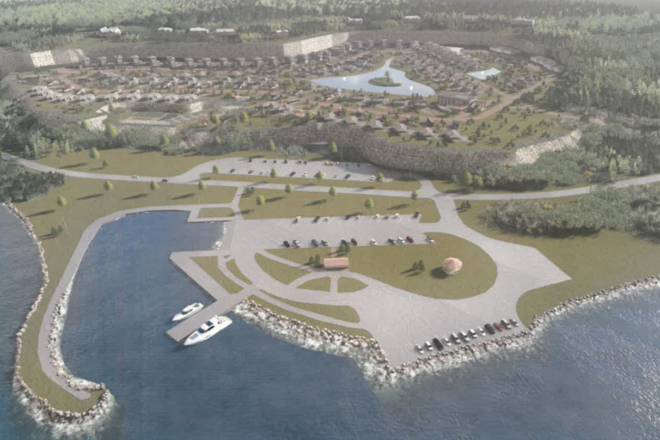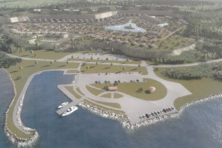Quarry RV Park Development Denied by County
- Share
- Tweet
- Pin
- Share

The Door County Resource Planning Committee (RPC) voted unanimously to deny a conditional use permit (CUP) on Wednesday, Feb. 26, for the proposed RV and home development at the old stone quarry site in the Town of Sevastopol.
The RPC based its decision on its determination that the application did not meet several requirements for a conditional use permit. The primary provisions were that it would negatively affect neighboring property values, does not fit the Door County Comprehensive Plan and was not similar to other uses in the area. The committee also determined that it did not meet three other provisions of the ordinance.
The committee determined that the applicant did not provide sufficient evidence that the project would not have an adverse impact on neighboring property values.
“I felt their burden of proof was not met,” said Vinni Chomeau, who argued that the comparable developments that the applicants cited were not similar to the neighborhood surrounding the quarry. The surrounding area is made up of single-family homes on larger lots. The comparison developments were located in light industrial or forested areas, not near residential neighborhoods and not in wide, open locations such as the quarry.
“Other areas were wooded, where this is wide, open, bare slate,” Dave Enigl said. “For me, the opposition did a better job of confirming that this will affect property values.”
The developers may appeal the decision to the Door County Board of Adjustment. Mike Parent, one of the developers behind the project, said he was disappointed with the decision and may go that route.
“We thought we provided enough information that they should have voted positively for us,” Parent said. “I think they only mentioned the word ‘zoning’ once or twice, and the information they based their vote on was subjective.”
Parent said they may appeal the decision, but they are also examining options they could pursue with over-the-counter permits.
“We have also looked at other uses for the property and have done a business plan for over-the-counter uses that could allow for more density, less control and less public interest,” Parent said.
Brenda Lange, who lives above the quarry, said it was telling that so many people spoke against the plan at multiple meetings while there was only one in favor of the project.
“I’m happy with this decision,” she said. “I think it says a lot that we have so much county support from residents and tourists.”
Parent and his partner in the development, Tom Goelz, hired Kurt Kielisch of Forensic Appraisal Group to carry out a survey of similar developments to determine the likely impact of this one on neighboring property values. Kielisch presented information about communities where similar RV resorts exist in surrounding states, including Michigan.
Enigl said Wednesday he thought the applicant could have pointed to comparable areas in Door County, such as the many campgrounds.
“We do believe there is a temporary stigma attached to neighboring properties,” Kielisch said. But, he added, that eventually declines, and there is no long-term stigma affecting surrounding property values.
The opposition poked holes in the survey, pointing out that Hearthside Grove – the Petosky, Michigan, development most often cited by developers as a model for this project – is located in a light industrial area that’s very different from the neighborhood of single-family homes surrounding the quarry.
Wednesday’s decision came after the RPC heard nearly eight hours of testimony from developers and opponents of the project the previous Thursday, Feb. 20, during a public hearing held at the ADRC Community Center in Sturgeon Bay.
RPC Chair Ken Fisher said that was the longest single meeting he had ever been a part of. The meeting packet the RPC members had before them to review was more than 1,400 pages long. The meeting was held at the community center to accommodate a crowd of more than 100 people who showed up for the proceedings.
The 117-site development would be located at the former Leathem Smith quarry across from George Pinney County Park on Bay Shore Drive. Each site would be 9,000 square feet, on which owners would have the option to build homes with a first-floor footprint of up to 1,200 square feet. At full build-out, the project could include 115 homes (two sites are only large enough for RV pads).
The development would allow only Class A motor coaches, which can cost between $200,000 and $1 million, and look similar to a tour bus.
The plan includes ponds for stormwater management and aesthetics, a clubhouse, a swimming pool, and tennis and pickleball courts. Developers have emphasized that the project is a permitted use for the site under county zoning. They are not seeking a zoning change or variance for the quarry, which is owned by Peggy Dreutzer and has been zoned Recreation Commercial since 1968.
“At some point, something has got to happen to that piece of property,” said Pete Hurth, an engineer from Baudhuin Engineering.
He seemed surprised by the level of outrage regarding the proposal.
“There’s always opposition,” he said. “I get that. Nobody likes anything changed. But this is quite the opposition.”
A well-organized opposition group made up of nearby residents and other concerned citizens questioned many aspects of the plan. The committee received more than 140 pieces of correspondence opposing the proposal. Other than the developers, no residents spoke in favor of the plan during the Feb. 20 meeting. Opponents focused heavily on wastewater- and stormwater-management plans and the RV park’s potential impact on surrounding property values.
Geologist Roger Kuhns argued that the site and surrounding wells are much more susceptible to groundwater contamination than developers have asserted because of the fractured karst rock. Kuhns argued that by his calculations, the project will require disturbing more than 100,000 cubic yards of stone, which would require a mine reclamation plan.
Hurth said the developers plan to put an average of 18 inches of material and soil on top of the existing rock – with a significant part of that coming from rock excavated for stormwater ponds on the site. The plan calls for curbs and gutters to control runoff and guide it to the stormwater-retention pond. The water would then flow down to another pond below the bluff on Bay Shore Drive. The stormwater-management plan has not yet been approved by the Wisconsin Department of Natural Resources, which has requested a geological study after challenges from the No Quarry RV Village group.
Opponents also asked the RPC to deny the Conditional Use Permit based on the potential impact of increased traffic along Bay Shore Drive, threats to public health and safety from excavation and blasting, and the disturbance of a historically significant site.
Developers have noted that they would be required to adhere to all state regulations when it comes to blasting and excavation, including dust and noise control. Hurth said that arguments about traffic impacts have been overblown.
“These RVs will not be coming and going on a regular basis,” he said. “People will come up, park the RV, hook it up, and most will leave it there for the season.”
Near the seven-hour mark of the meeting, Fisher asked the developers about the finances behind the proposal.
“I don’t think anyone can vote for this based on a pipe dream,” he said. Committee members and opponents expressed concerns about what happens if lots in the development don’t sell, or construction begins and the developers run out of money in the middle of the project.
Goelz said that to this point, the development team has been spending its own time and money on the project, but he did not have a clear answer about financing once the project begins.
“When we plugged ourselves into various people in the industry,” he said, “people told us that people loan money to these things because they believe in them. But you have to have the permits first. Until you have permits in hand, you don’t have anything. Without a permit, we don’t have anything to finance or to sell.”




